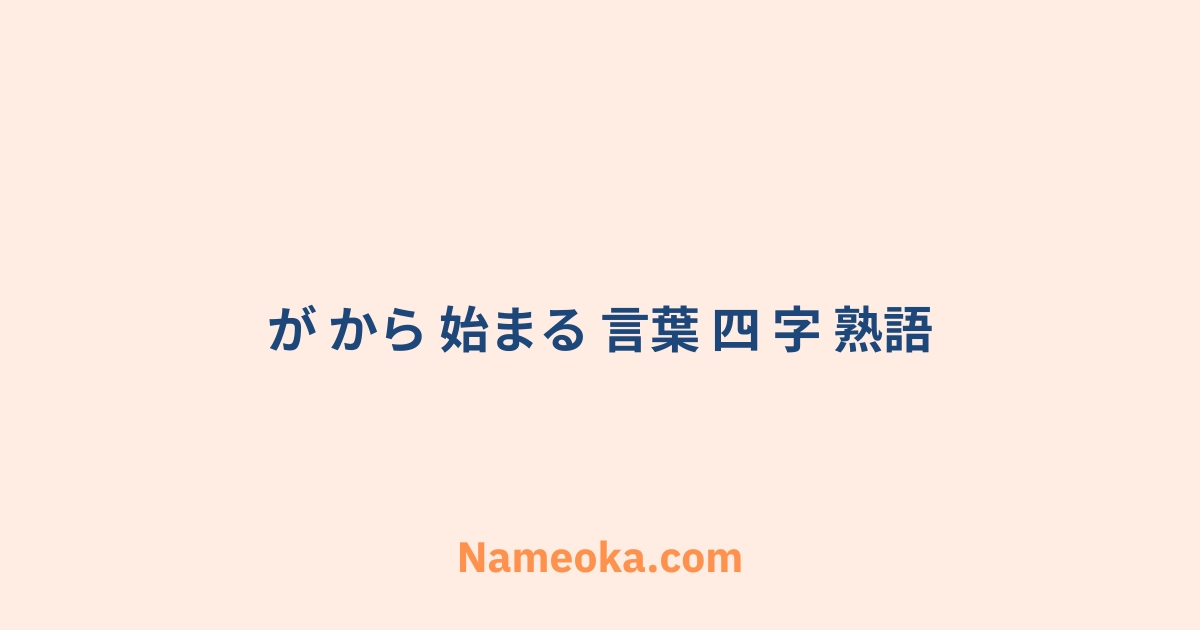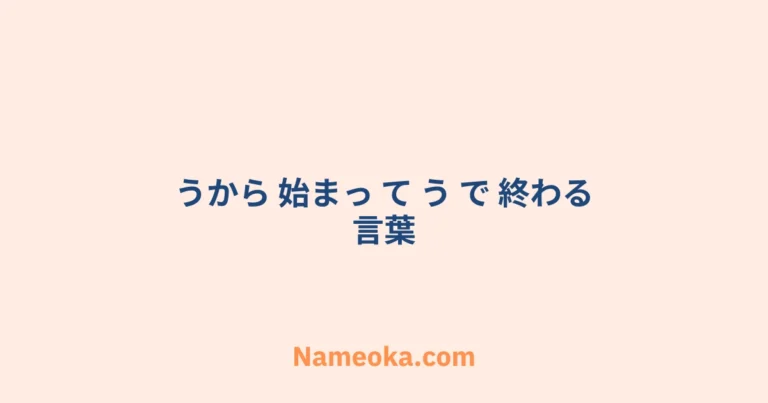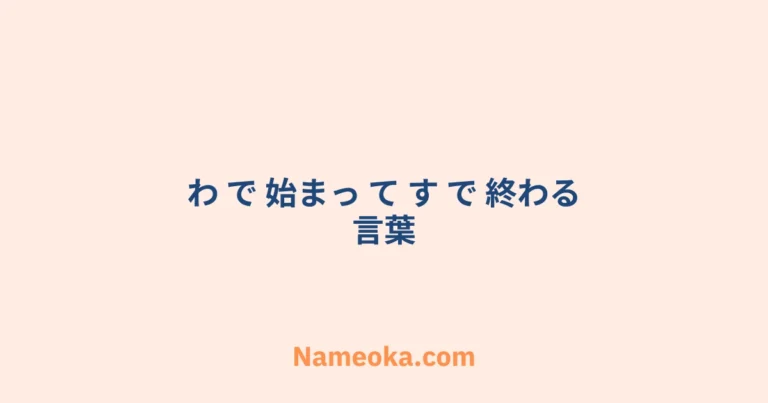がから始まる言葉四字熟語の世界へようこそ。日本語には日常の会話からビジネスシーンまで幅広く使われる四字熟語が豊富にあります。この特別な表現は、人間関係の深まりや思考をより豊かにするヒントを与えてくれます。本記事では、がから始まる興味深い四字熟語を厳選して紹介し、それらの意味や使い方を詳しく解説します。この知識を活かして、言葉の持つ力を感じ取りましょう。.

43+ が から 始まる 言葉 四 字 熟語
- 1. 我田引水
- 2. 画竜点睛
- 3. 学問卓識
- 4. 雅俗混交
- 5. 画蛇添足
- 6. 瓦解土崩
- 7. 臥薪嘗胆
- 8. 楽観主義
- 9. 画虎成狗
- 10. 完璧帰趙
- 11. 雅楽多彩
- 12. 蛾眉月貌
- 13. 画期的召集
- 14. 雅俗兼備
- 15. 合縁奇縁
- 16. 我武者羅
- 17. 画仙梅花
- 18. 我行我素
- 19. 画餅充飢
- 20. 学歴社会
- 21. 上善若水
- 22. 外柔内剛
- 23. 画蛇添足
- 24. 瓦解玉折
- 25. 我田地拝
- 26. 金科玉条
- 27. 銀装束砦
- 28. 楽天地開
- 29. 我慢強さ
- 30. 外国語辞典
- 31. 垢不洗顔
- 32. 雅量厚徳
- 33. 外交辞令
- 34. 高下不動
- 35. 合従連衡
- 36. 玉石混淆
- 37. 言語道断
- 38. 快刀乱麻
- 39. 蓋世不羈
- 40. 学而不厭
- 41. 雅量多聞
- 42. 中庸之道
- 43. 顧曲周郎
- 44. 外厩内厩
Japanese Idioms And Their Cultural Significance
Japanese idioms, or “kotowaza” (諺), are an integral part of the Japanese language and culture, often reflecting the values, beliefs, and historical experiences of the society. Here are a few notable Japanese idioms and their cultural significance:
- 猿も木から落ちる (Saru mo ki kara ochiru) – Even monkeys fall from trees.
- Meaning: Even experts can make mistakes.
Cultural Significance: This idiom highlights the importance of humility and the acceptance that nobody is perfect, regardless of their skill or experience. It reflects the value placed on perseverance and continual self-improvement in Japanese culture.
出る釘は打たれる (Deru kugi wa utareru) – The nail that sticks out gets hammered down.
- Meaning: Conforming to group norms is preferred over standing out.
Cultural Significance: This idiom underscores the collectivist nature of Japanese society, where group harmony and conformity are often prioritized over individuality. It reflects the societal tendency to value consensus and cohesiveness.
石の上にも三年 (Ishi no ue ni mo san nen) – Three years on a stone.
- Meaning: Perseverance leads to success.
Cultural Significance: This idiom conveys the idea that patience and endurance can overcome challenges. It is often used to encourage persistence, reflecting the cultural appreciation for dedication and long-term effort.
猫に小判 (Neko ni koban) – Gold coins to a cat.
- Meaning: Giving something valuable to someone who cannot appreciate it.
Cultural Significance: Used to communicate the futility of offering something valuable to someone who does not recognize its worth, this idiom reflects the value placed on knowledge and awareness.
花より団子 (Hana yori dango) – Dumplings over flowers.
- Meaning: Substance over style.
Cultural Significance: Often used to describe someone who prefers practicality over aesthetics, this idiom emphasizes the importance of practicality and essentials over superficial appearances.
雨降って地固まる (Ame futte ji katamaru) – After the rain, the ground hardens.
- Meaning: Adversity can strengthen a person or situation.
Cultural Significance: This idiom is used to encourage resilience in the face of difficulties. It reflects the belief that challenges can lead to personal growth and stronger foundations.
口は災いの元 (Kuchi wa wazawai no moto) – The mouth is the source of disaster.
- Meaning: Words can cause trouble.
- Cultural Significance: Emphasizing the importance of thoughtfulness and discretion in speech, this idiom reflects the cultural value of being considerate and mindful of the potential impact of one’s words.
These idioms offer insights into Japanese cultural norms and values, illustrating the society’s emphasis on harmony, perseverance, humility, and practicality. They serve not only as linguistic expressions but also as reflections of the collective wisdom passed down through generations.
The Role Of Yojijukugo In Modern Japanese Language
Yojijukugo (四字熟語) refers to four-character idiomatic compounds in the Japanese language, often of Chinese origin. These expressions play a significant role in modern Japanese language and culture, and they encapsulate complex ideas succinctly. Here are some key aspects of their role:
Cultural Heritage: Many yojijukugo have origins in Chinese literature and philosophy, reflecting the historical influence of Chinese culture on Japan. They often carry deep cultural and historical meanings.
Linguistic Efficiency: Yojijukugo are highly concise, allowing speakers to convey intricate ideas or moral lessons effectively and efficiently. This linguistic economy is particularly valued in Japanese communication, which often emphasizes brevity and subtlety.
Education and Formal Communication: These expressions are frequently used in education, appearing in textbooks, exams, and learning materials to enrich vocabulary and comprehension. In formal communication, yojijukugo can add nuance and depth to speeches, essays, and official documents.
Creative Expression: Writers, poets, and other creatives utilize yojijukugo for their aesthetic and rhetorical qualities. They can evoke vivid imagery or emotional resonance, making them a powerful tool in literature and media.
Moral and Ethical Lessons: Many yojijukugo encapsulate moral lessons or traditional wisdom, serving as proverbs or guiding principles in daily life. They often reflect Confucian, Buddhist, or Taoist philosophies, emphasizing values like perseverance, harmony, and integrity.
Clichés and Modern Adaptations: Some yojijukugo have become clichés due to their frequent use, while others are adapted or coined to reflect modern experiences. This evolution demonstrates their ongoing relevance in adapting to contemporary society.
Interpersonal Communication: In conversations, yojijukugo can convey shared cultural understanding or highlight the speaker’s eloquence and education, enhancing social interactions.
Pop Culture and Media: In recent years, yojijukugo have also found their way into manga, anime, and advertising, often used humorously or creatively to engage audiences and convey messages.
In summary, yojijukugo serve as a bridge between traditional and modern Japanese language, enriching communication with cultural depth, succinctness, and expressive power. Their enduring popularity and adaptability highlight their integral role in shaping Japanese linguistic and cultural expression.
Understanding The Structure And Meaning Of Japanese Four-Character Idioms
Japanese four-character idioms, known as “yojijukugo” (四字熟語), are a significant and fascinating part of the Japanese language. These idioms are typically composed of four kanji characters and carry meanings that are often more profound than the literal sum of their parts. Understanding the structure and meaning of these idioms can offer deeper insights into Japanese culture and expression.
Structure of Yojijukugo
Four Kanji Characters: As the name suggests, yojijukugo are made up of four kanji characters. Each character can often represent a concept, and together, they convey a specific meaning.
Form and Origin: Many yojijukugo are derived from classical Chinese literature and proverbs, given the historical influence of Chinese culture on Japan. However, some have indigenous Japanese origins.
Types of Yojijukugo:
- Descriptive: These describe situations or characteristics, akin to adjectives. For example, “一石二鳥” (isseki nichō), meaning “killing two birds with one stone.”
- Proverbial: These impart wisdom or advice, similar to proverbs. An example is “見塞興業” (kensai kōgyō), meaning “to make use of local resources for development.”
- Idiomatic: These often carry idiomatic meanings that can’t be understood through their literal translation. For example, “十人十色” (jūnin toiro), meaning “ten people, ten colors,” conveys the idea that everyone has their own tastes and opinions.
Meaning and Usage
Abstract Meanings: The meaning of yojijukugo often extends beyond their literal sense. It’s essential to understand the context and background to grasp their intended meaning.
Cultural Insights: Yojijukugo often reflect cultural values and prevailing philosophies. For instance, “温故知新” (onkochishin) suggests learning from the past to develop new ideas, highlighting the importance of tradition and innovation.
Everyday Use: While some yojijukugo are used in daily conversation, many are considered more literary or formal. Their use can add a touch of eloquence or wisdom to communication.
Learning Yojijukugo
Study Kanji: Understanding the individual characters can be helpful, as they often provide clues to the idiom’s full meaning.
Contextual Learning: Reading yojijukugo in context, such as in literature or when used by native speakers, can aid in understanding their nuances.
Cultural Association: Familiarize yourself with the cultural or historical stories behind yojijukugo, as these narratives can enrich your comprehension and appreciation of them.
Understanding yojijukugo not only enhances your Japanese language skills but also provides a window into the rich tapestry of Japanese thought and tradition.
よくある質問
がから始まる言葉四字熟語にはどんなものがありますか?
例えば、がんばればできるという意味で『我慢侍知』や、冷静さと決断力を持つことを示す『鑑共冷静』などがあります。.
がから始まる言葉四字熟語の中で日常生活で使われるものは?
日常生活でよく聞かれるがから始まる言葉四字熟語には『我田引水』があります。自分に都合よく解釈することを意味します。.
がから始まる言葉四字熟語を勉強する方法を教えてください。
がから始まる言葉四字熟語を覚えるには、漢字辞典を使うことや、例文の中で実際に使ってみることが効果的です。また、カードゲームやアプリも楽しい学習法です。.












